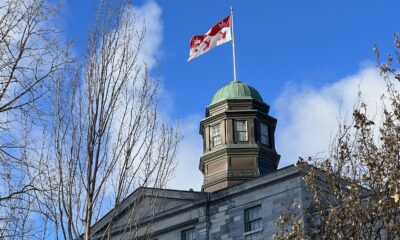Politics
Justice Minister’s Supreme Court Challenge Risks Canada’s Unity

The recent intervention by Justice Minister Sean Fraser into the constitutional challenge against Quebec’s Bill 21 may have significant implications for Canada’s political landscape. Fraser announced that the federal government intends to challenge the law, which outlines the secular nature of the state, in the Supreme Court. His ambition is to reshape the provinces’ ability to utilize the notwithstanding clause, a constitutional safeguard that allows legislatures to bypass certain Charter rights under specific circumstances.
Fraser’s actions could lead to a ruling that effectively serves as a constitutional amendment, a move critics argue contradicts the original intentions of Canada’s constitutional framers. If successful, this intervention could exacerbate tensions in Quebec and reignite discussions surrounding sovereignty, marking the most substantial secession crisis since the province’s independence referendums in the late 20th century.
Historical Context of the Notwithstanding Clause
The relationship between Quebec and the rest of Canada has been fraught with complexity, particularly regarding the balance of power and judicial authority. During the 1980 referendum campaign, then-Prime Minister Pierre Trudeau assured Canadians that a defeat for Quebec’s independence would lead to a reevaluation of Canadian federalism. Quebec’s former Premier René Lévesque expressed concerns that judicial activism could undermine the province’s authority, particularly pointing to the Supreme Court’s power to supersede Quebec’s National Assembly.
Following these events, then-Justice Minister Jean Chrétien negotiated the inclusion of the notwithstanding clause in the Constitution, acknowledging its importance in preserving a degree of legislative power against potential judicial overreach. This clause has been vital for Quebec, allowing the province to assert its policy preferences without facing judicial challenges that could threaten its distinct cultural identity.
Over the past four decades, the Supreme Court of Canada has approached the use of the notwithstanding clause with caution. The landmark case Ford v. Quebec established that legislative actions invoking this clause could not be challenged based solely on their policy implications, reinforcing the autonomy of provincial legislatures.
Implications of the Current Challenge
The current government of Prime Minister Mark Carney is pushing for a new interpretation of the notwithstanding clause, arguing that “irreparable impairment of a right or freedom” could constitute an unauthorized amendment to the Constitution. This perspective, if upheld, would overturn the precedent set in Ford, allowing for unprecedented scrutiny of the notwithstanding clause and potentially curbing its use in Quebec and beyond.
Fraser’s confidence in this approach raises concerns about the potential backlash in Quebec, especially in light of upcoming political events, such as the anticipated election of a Parti Québécois government in 2026 and a possible sovereignty referendum by 2030. Should the Supreme Court rule in favor of the federal government, many Quebecers may interpret this as a signal that the terms of Confederation are subject to change at the federal government’s discretion, undermining the province’s autonomy.
Fraser and Carney’s strategy could be viewed as politically shortsighted, ignoring the historical context of Quebec’s relationship with the rest of Canada. The fear is that a ruling against the province could galvanize support for sovereignty, with many considering that judicial supremacy in Canada might threaten the ongoing existence of a distinct Quebec within the national framework.
For the sake of national unity, it is essential for Carney to consider the wisdom of Chrétien. The viability of the notwithstanding clause is crucial not just for the Charter’s legitimacy, but potentially for the future of Canada itself. The constitutional framework must not become an argument for secession; rather, it should reflect the diverse needs of all provinces within a cooperative federal structure.
Ryan Alford, a constitutional historian and professor at the Bora Laskin Faculty of Law, emphasizes that the current trajectory could lead to a precarious situation for Canadian unity. As this case unfolds, the ramifications of judicial interpretations will be closely watched, with the potential to redefine the relationship between Quebec and the federal government for generations to come.
-

 Politics4 weeks ago
Politics4 weeks agoSecwepemc First Nation Seeks Aboriginal Title Over Kamloops Area
-

 World5 months ago
World5 months agoScientists Unearth Ancient Antarctic Ice to Unlock Climate Secrets
-

 Entertainment5 months ago
Entertainment5 months agoTrump and McCormick to Announce $70 Billion Energy Investments
-

 Science5 months ago
Science5 months agoFour Astronauts Return to Earth After International Space Station Mission
-

 Lifestyle5 months ago
Lifestyle5 months agoTransLink Launches Food Truck Program to Boost Revenue in Vancouver
-

 Technology3 months ago
Technology3 months agoApple Notes Enhances Functionality with Markdown Support in macOS 26
-

 Lifestyle3 months ago
Lifestyle3 months agoManitoba’s Burger Champion Shines Again Amid Dining Innovations
-

 Top Stories2 months ago
Top Stories2 months agoUrgent Update: Fatal Crash on Highway 99 Claims Life of Pitt Meadows Man
-

 Politics4 months ago
Politics4 months agoUkrainian Tennis Star Elina Svitolina Faces Death Threats Online
-

 Sports5 months ago
Sports5 months agoSearch Underway for Missing Hunter Amid Hokkaido Bear Emergency
-

 Politics5 months ago
Politics5 months agoCarney Engages First Nations Leaders at Development Law Summit
-

 Technology5 months ago
Technology5 months agoFrosthaven Launches Early Access on July 31, 2025




















